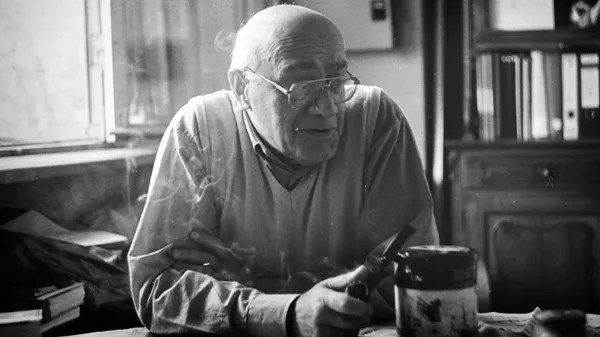
Repeating Mamardashvili Essay 1 – On Rupture | Katharina Stadler
In ‘Repeating Mamardashvili’ conceptual artist Katharina Stadler is focusing on Merab Mamardashvili's two lecture series on Proust [1981/82 & 1984/85 at Tbilisi State University]. She is using AI for translation in order to create a grid of content approximation.
Through the process of working with AI translators, the artist aims to trace a dialogue between content and the unintelligible and attempts to outline a structure in search for both beginning and end of ideological structures through/in/across language.
The translation process as a method will be accompanied by a set of notations on both process and content. These notations, in form of essays, will be published here.
When creating art, there are those moments when things fall into place. When concept and form merge or overlap, and a specific certainty sets in, because one knows that now, things are right.
These moments seem to happen out of the blue. One might have been turning and twisting one's mind for weeks and months, one might have produced, and discarded, a whole series of trials and errors; both the reflections and the form attempts most certainly have not been in vain, but when this sudden clarity strikes, the world seems in disarray to settle at the same time into a new order of its own.
In 2010, an interview with Mladen Dolar about the question of what is art was published on the platform wiegehtkunst.com, a project by artist Conny Habbel. In the interview Dolar points to process, production and finished works of art, their intended and needed break, outlining further that not only art functions this way, but that also philosophy works through these moments of rupture, stating: 'I'm not saying that art is the only way to do this. I think thought is something which does this also, it breaks with the conditions of its own production. This is the practice of philosophy. I think philosophy, similarly, but also very differently, makes a conceptual break in the continuity of particular received ways of thinking. […] There are very few occasions when thought happens and when it does, it seriously changes the very parameters of the ways we conceive the world, ourselves, whatever.'
Philosophy and/or art, disciplines embedded between content and form, processes of similarity, and not; connected when thought happens.
When Robert Pfaller writes in his most recent book Die blitzenden Waffen. Über die Macht der Form that 'Dort, wo ein Denken durch bestimmte Kräfte festgehalten wird, braucht es neue, andere Kräfte, um es freizusetzen. Und diese Freisetzung kann nicht methodisch und schrittweise, sondern nur plötzlich erfolgen,' [Where thought is kept hold of certain forces, other forces are needed to set it free. And this release cannot be methodical or step by step, it can only happen suddenly,] he points to the forces at work, triggering the moment, when thought happens. He then continues to elaborate on these forces based on Roland Barthes' concepts of studium and punctum, making punctum the weapon of rupture, of freeing thought. Suddenly.
It doesn't come as a surprise, that, in Uldis Tirons' essay I come to you from my solitude, published in 2006, the author mentions in a footnote that Merab Mamardashvili '[…] insisted on speaking practically off the cuff so much, perhaps occasionally making use of quotes and examples prepared beforehand. Mamardashvili believed that it is exactly when speaking in this manner that the something of which we have no previous knowledge but which nevertheless happens, could happen.'
Speaking in order to let a thought find precision. Speaking in order to possibly set thought free. Speaking freely to bring out a thought that hasn't been thought like this before. Because of the possibility of rupture.
'Repeating Mamardashvili' seeks these moments of rupture. Those that occurred during Merab Mamardashvili's lectures on Proust. And those that might happen while allowing AI translators to do their work.
Pfaller, Robert. Die blitzenden Waffen. Über die Macht der Form. [The flashing weapons. About the power of form]. Frankfurt/Main: Fischer, 2020.
Tirons, Uldis. I come to you from my solitude. https://www.eurozine.com/i-come-to-you-from-my-solitude/. 2006.
Wie geht Kunst? Interview: Mladen Dolar. http://www.wiegehtkunst.com/?p=599. 2010.



